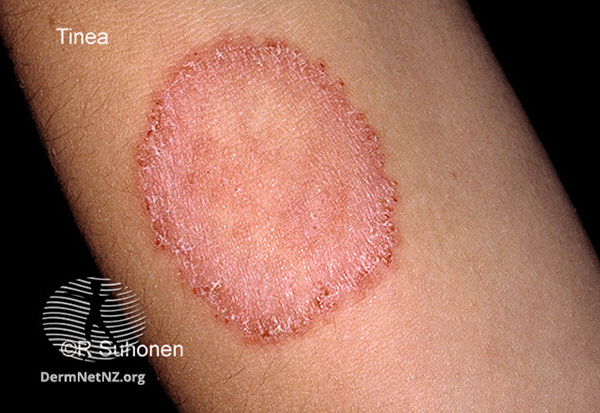Ringworm
Ringworm
Ringworm is a flat, ring-shaped infection. See your doctor if the ringworm is on your child's scalp as this needs treatment with medicine.
Key points about ringworm
- ringworm on the scalp can cause round, painful red patches and make hair fall out - see your doctor if this happens
- go to the doctor if your child has a fever or their skin becomes swollen, warm or is leaking fluid
- ringworm spreads by contact with infected skin, clothes, personal items or surfaces
What is ringworm?
Ringworm, sometimes called tinea, is a common skin infection caused by a fungus and not a worm.

How is ringworm spread?
The fungus is easily passed between people by contact with infected skin, objects or surfaces. It's possible to get ringworm from:
- having skin-to-skin contact with someone who has it
- petting an animal like a dog, cat, or farm animal infected with ringworm
- touching soil infected with ringworm
- using an infected object like a phone, comb or towel
The fungi that cause ringworm can live on any infected object, including clothing, hairbrushes and sports equipment for a long time.
What are the symptoms of ringworm?
Children can get ringworm anywhere on their skin.
It can appear on the trunk of the body, arms, legs, feet, or scalp.
Symptoms of ringworm on the body are:
- redness
- itching
- discomfort
- a ring shaped rash around normal-looking skin
The infection usually starts as flat, scaly spots with a raised red border that spreads outwards in a circle. The border may be scaly and may blister, while the centre of the area often becomes more normal in appearance with fine scaling. Ringworm is often itchy.
On the scalp, ringworm causes small, painful raised pimple-like bumps. The bumps will spread and leave fine, scaly patches of skin. It also causes bald spots and broken hair. This condition is most often seen in pre-teens.
What should I do if my child has ringworm?
Ringworm is caused by a fungus, so your child needs treatment with antifungal products.
Antifungals products come in a variety of forms such as creams, lotion, powder, spray or gel. Talk to your pharmacist about what is right for your child.
- check and clean skin everyday
- check your other children for ringworm
- treat any animals or pets with ringworm
When should I take my child to the doctor?
See your doctor if:
- the ringworm is on your child's scalp as this may need treatment with another medicine
- your child has a fever or their skin becomes swollen, warm or is leaking fluid or pus
- the ringworm is not getting better with treatment form the pharmacy
Will my child need time off from kura or school?
Your child can go to school or childcare but they should avoid skin contact with other children until the ringworm goes away. It's a good idea to make sure your child's ringworm is covered - with clothing and footwear etc.
This page last reviewed 14 November 2022.
Do you have any feedback for KidsHealth?
If you have any feedback about the KidsHealth website, or have a suggestion for new content, please get in touch with us.
Email us now